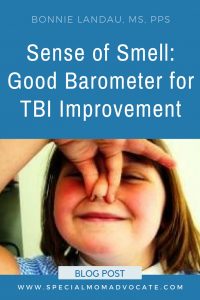 “Mommy, I smell smoke,” Michael said.
“Mommy, I smell smoke,” Michael said.
“Smoke?” I questioned.
“Yes, really stinky smoke,” he replied. Then I noticed the tar vat in the lane next to us. Indeed he smelled some of the ickiest smoke possible — melted tar. And then I got really excited. He was smelling things!
Usually if I say, “Wow, that skunk is smells awful,” Michael would say, “What skunk?” Through all the list of symptoms and assessments, the lack of sense of smell was something I always mentioned. But nobody ever really caught on that it was a significant symptom of traumatic brain injury.
There are many symptoms that can occur post-concussion, and loss of sense of smell and sense of taste are two that are actually quite common. It doesn’t necessarily happen right after the injury either. It can be a gradual fading of the sense. If a person has sinus issues, it may be attributed to sinus congestion too. But if long term loss of taste and smell are persistent, it could be a sign of head injury.
Through all the assessments we had done with our son, I always asked the assessor if that meant anything. They always said no. And yet, if I had told them he was over sensitive to smell, they would have taken notice of that.
The great news is that neurofeedback was changing all of this. His sense of smell is returning, and he has begun to smell things he used to ignore. This is thrilling! It’s yet another indication that his brain is healing!


